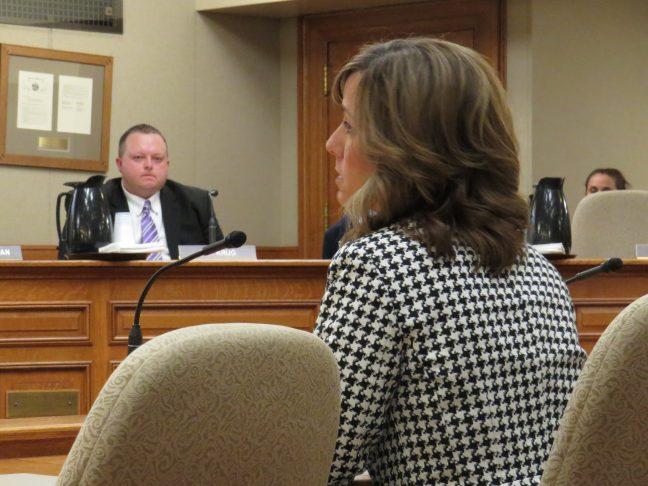The sound of people holding back tears peppered a public hearing in the State Capitol Wednesday as legislators considered a new bill about decriminalizing the use of a medical marijuana extract in Wisconsin.
The Assembly Committee on Children and Families held a public hearing for Assembly Bill 49, which defines the use of cannabidiol (CBD) and tetrahydrocannabinols (THC).
CBD is an oil extract of marijuana, while THC is the high-inducing agent of marijuana.
This bill, authored by Sen. Van Wanggaard, R-Racine, and Rep. Scott Krug, R-Nekoosa, seeks to make the possession of doctor-certified CBD legal in Wisconsin.
Wanggaard said a main aim of the bill is to eliminate the fear for parents who have CBD oil.
CBD oil is a substance extracted from marijuana that can reduce symptoms including seizures. THC is similar to CBD oil but includes some psychoactive effects. While THC-free CBD is legal to dispense in Wisconsin through the Farm Act, it is not legal to possess the oil with THC.
Lydia’s Law, passed in 2014, allows doctors and pharmacists to dispense CBD oil. Wanggaard said the law has been ineffective despite the Legislature’s “best intentions” because it concerns a federal issue.
The federal government designates CBD as a Schedule 1 substance. The U.S. Drug Enforcement Administration classifies drugs, substances and chemicals into five categories, with Schedule 1 drugs being at a high potential for abuse and severe psychological or physical dependence.
The bill would have Wisconsin follow suit within 30 days if the federal government changed CBD oil’s status as a Schedule 1 substance.
People must jump “many” regulatory hurdles to dispense or prescribe CBD oil in the state, including expensive clinical trials, Wanggaard said.
“Unfortunately, due to bureaucratic red tape with these trials and, frankly, a lot of misinformation about CBD oil, those that need this potentially life-changing medicine are unable to obtain it legally in Wisconsin,” Wanggaard said.
After a Fond du Lac leaders news conference at the Capitol, Gov. Scott Walker told reporters while he is cautious about “opening the door to full-fledged marijuana legalization,” he would support the measure of the bill that aims to legalize possession of a marijuana extract to treat seizures.
The bill would not legalize recreational or medical marijuana, only CBD oil, Wanggaard said.
Krug said compared to three years ago, when efforts to legalize CBD in Wisconsin had few co-sponsors, the bill has much more support. In addition to the two main goals of the bill, he said he intends to make sure parents and doctors are the ones making these medical decisions.
Assembly Bill 49 has more than 60 bipartisan co-sponsors compared to the nine of a failed 2013 bill.
“I don’t want us to be too late again,” Krug said.
Though the bill would make possession legal, Rep. Jill Billings, D-LaCrosse, said it is not a “total fix” because it doesn’t address how people can obtain CBD. Krug said this is the farthest they could push the bill at the time and still hope to get it passed.
Rep. Chris Taylor, D-Madison, said though she supports the bill, she thinks it needs to do more, especially concerning legal dispensaries.
“These families need this for their kids,” Taylor said. “I think it’s absolutely ridiculous that it has taken this legislature six years to make sure families get this so they can save their kids’ lives.”
Rep. Samantha Kerkman, R-Salem, said the stories and information shared over the years have changed her heart and mind on the issue.
All attendees who testified at the hearing were in favor of the bill except one who said the bill didn’t do enough and she was tired of “token legislation.”
Sally Schaeffer, who has repeatedly testified for legalizing medical marijuana, spoke first about her daughter’s diagnosis with a rare genetic syndrome and epilepsy. Schaeffer’s daughter died from a seizure while Schaeffer was on the road.
Shortly afterward, a Florida legislator passed Charlotte’s Web Law, which authorized physicians to prescribe low-THC cannabis for specific patients.
“I waited for the law to pass, and I still lost out,” she said. “I lost time with my daughter fighting for this law.”
Looking back at 420: Madison’s history of marijuana advocacy
People continued to come forward with stories of their families’ struggles.
One father said doctors diagnosed his 7-month-old son with epilepsy. When they ran out of options for prescribed epilepsy drug treatments and his son became developmentally and intellectually disabled, the family turned to CBD. He said the seizures have since diminished and his son has regained some control by learning to use sign language.
A Wisconsin grandmother whose 2-year-old granddaughter suffers from seizures said she has to break federal law to go to a different state and bring CBD oil back.
Krug said after working on the bill for four years, it is “heart wrenching” to know sometimes policy ideas don’t work they way they wanted.
The committee plans to hold an informational session next week.
“We’re finally getting to a point where everybody in the Capitol understands the need for what we’re doing today,” Krug said. “I think we’re finally in a good spot. Just hearing again from people we’ve met the last four years to reinstitute that message with other members has been helpful. We’re going to keep fighting until this thing is done.”
Sen. Chris Larson, D-Milwaukee, released a statement Wednesday that said the proposed legislation will not fully fix the problem. In response, he and Rep. Jimmy Anderson, D-Fitchburg, began circulating a bill, LRB 2105, for co-sponsorship that would make CBD manufacturing legal in Wisconsin.
“Senate Bill 10 does not go far enough to actually address the barriers in obtaining CBD medicine for suffering kids,” Larson said. “We cannot keep writing out prescriptions without a way for families to fill them in Wisconsin.”


